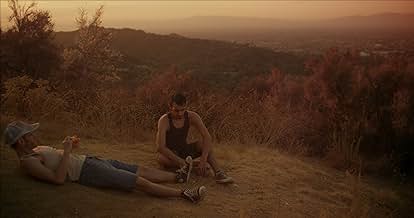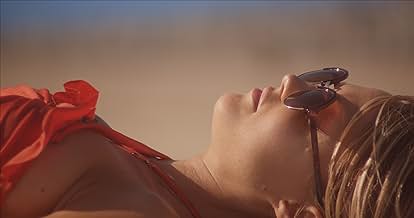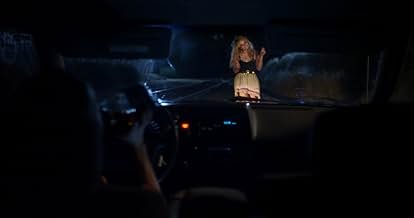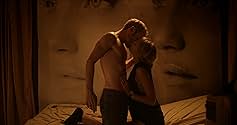PUNTUACIÓN EN IMDb
3,8/10
2,4 mil
TU PUNTUACIÓN
Añade un argumento en tu idiomaWhile filming his sadistic relationship with women, a killer's infatuation with a potential victim forces him to confront his past.While filming his sadistic relationship with women, a killer's infatuation with a potential victim forces him to confront his past.While filming his sadistic relationship with women, a killer's infatuation with a potential victim forces him to confront his past.
- Premios
- 6 premios y 11 nominaciones en total
Argumento
¿Sabías que...?
- CuriosidadesThe famous scream-queen Karen Black's last movie role.
- Banda sonoraHook Fuck ALT.
Written by Ryan Mcguffin & Dee Dee LeDuke (as Davis Leduke)
Performed by Ryan Mcguffin, Dee Dee LeDuke (as Davis Leduke), Caleb Steinmeyer
Guitar: Ryan Mcguffin
Drums: Dee Dee LeDuke (as Davis Leduke)
Vocals: Dee Dee LeDuke (as Davis Leduke)
Bass: Caleb Steinmeyer
Reseña destacada
Have you ever been in a movie theatre with an audience that burst into spontaneous and rapturous applause? How about following the punchline of the film's opening scene? I have, twice.
The first in 2003 during a preview screening of Kill Bill Vol. 1 in gleeful response to Tarantino's audacious gunshot to Uma Thurman's head.
The second occurred this past summer in Madrid during a film festival screening of Wild In Blue. And while the opening moments of this film also features a character with a gun to their head, it's made perfectly clear that Writer/Director Matthew Berkowitz has an altogether different kind of sucker-punch in mind.. and when the trigger is finally pulled - as was the case with Tarantino's film - he's got you exactly where he wants you.
The "where" is inside the twisted mind of Charlie, a kind of post-millennial Travis Bickel, acting out a disturbing manifesto all his own that involves the making of a film and the seduction and murder of a series of beautiful women.
I can only speak for myself, but I assure you that the Taxi Driver comparison isn't made lightly. While sitting in the theatre, it felt as though I was experiencing a post-millennial incarnation of Schrader's antihero, on a journey not through the grime of Scorsese's New York, but rather through the blissful wasteland of Los Angeles as seen through the narcotized lens of Gaspar Noe, or perhaps Nicolas Winding Refn. But while Bickel's disillusionment was a product of a politically and socially turbulent period in American History, Charlie's seems to have been instilled at birth (..to close this reference: Charlie is the product of the Travis Bickel generation). And fuelled by his own existential angst, parental failure, and an increasingly narcissistic and self-destructive culture, Charlie uses the God-like tool of cinema to create a privately defined world all his own, operating under the guiding principles of absolute control and total destruction.
Therein lies the brilliance of Wild In Blue; it is a film of contradictions. At once beautiful and brutal; blissful and jarring; sexual and sadistic; cerebral and kinetic. Moments of brutality punctuate those of sexual fantasy, while Charlie's existential stream of consciousness finds itself framing scenes that play as beautifully hypnotic tone-poems — albeit of the depraved, nihilistic variety.
If you've read the film's synopsis, you'd be forgiven for assuming Wild In Blue is an exercise in horror filmmaking (likely another entry in the slasher or torture porn sub-genres). And granted, there are fragments of these sub-genres to be found therein, but in reality Wild In Blue is as much a horror film as Drive is an action film or Taxi Driver is a revenge film. Such a premise acts as the jumping off point for something far more subversive; existential. Simply put: Berkowitz has far too much raw talent at his disposal, and a maniacal vision he's hell bent on seeing through to the end of Charlie's twisted story. It's clear that he adores the medium he's playing within; he has no interest in conforming to the increasingly generic and sanitized HBO inspired-cinematography that pervades the current filmic landscape; his is a camera infused with an intelligence of its own; wandering with an uneasiness that mirrors the intensity and unpredictability of his protagonist.
He's made a film brimming with mood and atmosphere; with tension. One that's intensely colourful and inventive, shocking and darkly humorous, sexy and menacing. And thanks to a stunning performance by Frank Ceremack, the same can be said about Charlie. In what could have so easily become a caricature of evil.. a ghoulish Patrick Bateman, Ceremack delivers an unhinged tour-de-force. It's his go-for-broke commitment to exploring the darkest depths of human existence that gives the film its soul; thanks to Ceremack, Charlie is a menacing and devastating anti-hero for the post-digital age.
The aforementioned references — particularly those to Noe, Refn and Schrader — will likely be apparent to fans of those auteurs' work while viewing Wild In Blue. But Berkowitz isn't recording a covers' album. With Wild In Blue, he manages to subvert expectations and carve out a path all his own. His is an aesthetic the equivalent of the late 70s/early 80s infused post-punk that scores the film; an attitude of reckless abandon, dripping with a nostalgia at once blissfully euphoric and violently crushing. He's got style to burn.
(A final note, in reference to my introductory statement: since most viewers won't have the advantage of experiencing Wild In Blue on a theatre screen.. do yourself a favour and watch this baby in the dark and PLAY — IT — LOUD).
The first in 2003 during a preview screening of Kill Bill Vol. 1 in gleeful response to Tarantino's audacious gunshot to Uma Thurman's head.
The second occurred this past summer in Madrid during a film festival screening of Wild In Blue. And while the opening moments of this film also features a character with a gun to their head, it's made perfectly clear that Writer/Director Matthew Berkowitz has an altogether different kind of sucker-punch in mind.. and when the trigger is finally pulled - as was the case with Tarantino's film - he's got you exactly where he wants you.
The "where" is inside the twisted mind of Charlie, a kind of post-millennial Travis Bickel, acting out a disturbing manifesto all his own that involves the making of a film and the seduction and murder of a series of beautiful women.
I can only speak for myself, but I assure you that the Taxi Driver comparison isn't made lightly. While sitting in the theatre, it felt as though I was experiencing a post-millennial incarnation of Schrader's antihero, on a journey not through the grime of Scorsese's New York, but rather through the blissful wasteland of Los Angeles as seen through the narcotized lens of Gaspar Noe, or perhaps Nicolas Winding Refn. But while Bickel's disillusionment was a product of a politically and socially turbulent period in American History, Charlie's seems to have been instilled at birth (..to close this reference: Charlie is the product of the Travis Bickel generation). And fuelled by his own existential angst, parental failure, and an increasingly narcissistic and self-destructive culture, Charlie uses the God-like tool of cinema to create a privately defined world all his own, operating under the guiding principles of absolute control and total destruction.
Therein lies the brilliance of Wild In Blue; it is a film of contradictions. At once beautiful and brutal; blissful and jarring; sexual and sadistic; cerebral and kinetic. Moments of brutality punctuate those of sexual fantasy, while Charlie's existential stream of consciousness finds itself framing scenes that play as beautifully hypnotic tone-poems — albeit of the depraved, nihilistic variety.
If you've read the film's synopsis, you'd be forgiven for assuming Wild In Blue is an exercise in horror filmmaking (likely another entry in the slasher or torture porn sub-genres). And granted, there are fragments of these sub-genres to be found therein, but in reality Wild In Blue is as much a horror film as Drive is an action film or Taxi Driver is a revenge film. Such a premise acts as the jumping off point for something far more subversive; existential. Simply put: Berkowitz has far too much raw talent at his disposal, and a maniacal vision he's hell bent on seeing through to the end of Charlie's twisted story. It's clear that he adores the medium he's playing within; he has no interest in conforming to the increasingly generic and sanitized HBO inspired-cinematography that pervades the current filmic landscape; his is a camera infused with an intelligence of its own; wandering with an uneasiness that mirrors the intensity and unpredictability of his protagonist.
He's made a film brimming with mood and atmosphere; with tension. One that's intensely colourful and inventive, shocking and darkly humorous, sexy and menacing. And thanks to a stunning performance by Frank Ceremack, the same can be said about Charlie. In what could have so easily become a caricature of evil.. a ghoulish Patrick Bateman, Ceremack delivers an unhinged tour-de-force. It's his go-for-broke commitment to exploring the darkest depths of human existence that gives the film its soul; thanks to Ceremack, Charlie is a menacing and devastating anti-hero for the post-digital age.
The aforementioned references — particularly those to Noe, Refn and Schrader — will likely be apparent to fans of those auteurs' work while viewing Wild In Blue. But Berkowitz isn't recording a covers' album. With Wild In Blue, he manages to subvert expectations and carve out a path all his own. His is an aesthetic the equivalent of the late 70s/early 80s infused post-punk that scores the film; an attitude of reckless abandon, dripping with a nostalgia at once blissfully euphoric and violently crushing. He's got style to burn.
(A final note, in reference to my introductory statement: since most viewers won't have the advantage of experiencing Wild In Blue on a theatre screen.. do yourself a favour and watch this baby in the dark and PLAY — IT — LOUD).
- DigitalSixx
- 9 dic 2015
- Enlace permanente
Selecciones populares
Inicia sesión para calificar y añadir a tu lista para recibir recomendaciones personalizadas
- How long is Wild in Blue?Con tecnología de Alexa
Detalles
- Fecha de lanzamiento
- País de origen
- Sitio oficial
- Idioma
- Títulos en diferentes países
- Зверство на голубом экране
- Localizaciones del rodaje
- Empresas productoras
- Ver más compañías en los créditos en IMDbPro
- Duración1 hora 22 minutos
- Color
- Relación de aspecto
- 16:9 HD
Contribuir a esta página
Sugerir un cambio o añadir el contenido que falta

Principal laguna de datos
By what name was Wild in Blue (2015) officially released in Canada in English?
Responde



























